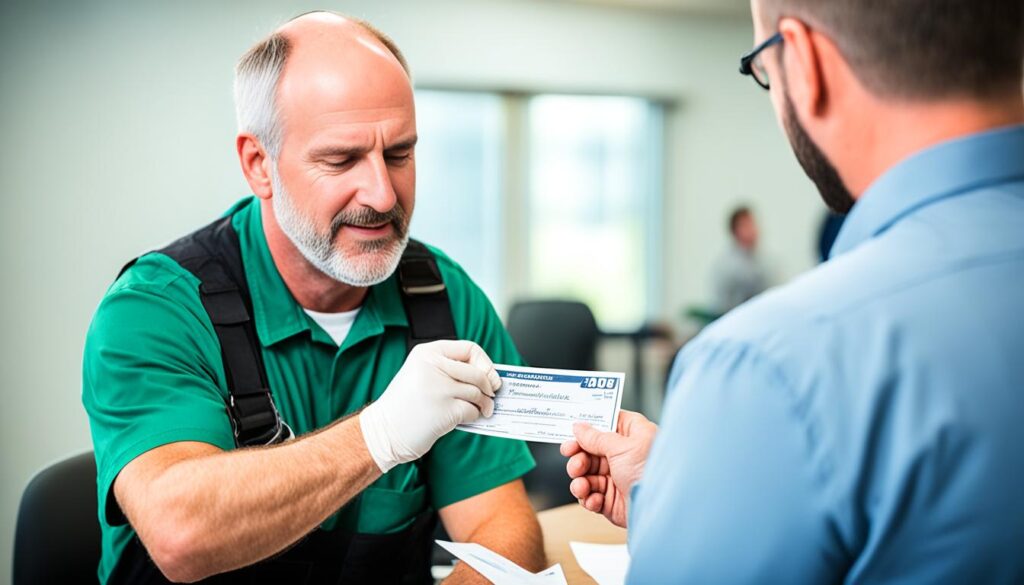Have you ever been hurt at work and wondered about your rights? Knowing how to file a claim for workplace injury compensation is key. In this guide, learn about your rights and how to navigate the process. Whether it’s a small accident or a big one, knowing what to do is essential for getting the compensation you need.

Key Takeaways:
- Reporting your workplace injury within the specified time frame is crucial to maintaining your claim.
- Seeking medical treatment from an authorized provider is important for documentation and proper care.
- Temporary total disability benefits may be available if you are unable to work due to your injury.
- The duration of your disability benefits depends on the severity of your injury and your ability to work.
- Understanding your legal rights, including the option to appeal a decision, is essential.
Reporting the Injury and Seeking Medical Treatment
Got hurt at work? It’s key to act quick. You need to protect your rights and get the right pay for your injuries. Reporting the injury and getting medical help are key steps.
First, tell your boss about your injury right away. If you can, do it just after it happens. You have 30 days to report it, or you might not get your workers’ comp claim. If you wait too long, you might lose your chance for compensation for workplace injuries.
After reporting, see a doctor your boss or their insurance picks. This doctor will give you care and medicine for your injury. Follow what the doctor says and go to all appointments. This helps prove your treatment for your workers’ comp claim.
Send all medical bills to your boss’s insurance. Make sure doctors bill the insurance right away to avoid payment delays. By reporting your injury fast and getting medical care, you help make sure your workers’ comp claim goes smoothly. You’ll get the compensation for workplace injuries you deserve.
Temporary Total Disability Benefits
Workplace accidents and injuries often lead to the question of compensation. We’ll look into temporary total disability benefits here. These benefits offer financial support while you recover.
In Florida, there’s no compensation for the first seven days of disability. But, if your disability lasts over 21 days, you might get paid for those first seven days too.
These benefits are paid every two weeks. They equal about 66 2/3 percent of your average weekly wage. This wage is based on your injury’s date and your work history.
Even if you’re on light or limited duty, you might qualify for these benefits. It’s important to check your eligibility with your employer or an attorney.

Understanding Temporary Total Disability Benefits
These benefits help if you can’t work at all due to a workplace injury. They are meant to cover your living expenses and medical bills. This support lets you focus on getting better.
“Temporary total disability benefits give crucial support to those hurt at work. They provide financial stability, letting you heal without money worries.” – Jane Smith, Workers’ Compensation Attorney
Remember, these benefits can’t last forever. Most people can only get them for up to 104 weeks. This depends on your injury and if you can work again.
Always follow your doctor’s advice during this time. Ignoring advice or lying about symptoms could lose you these benefits.
While valuable, it’s good to know all your compensation options. A lawyer specializing in workers’ compensation can guide you. This ensures you get every benefit you’re owed.
Timeframe and Duration of Disability Benefits
When you get hurt at work, you need to know about the disability benefits you can get. Workers compensation payout and employee injury benefits help you financially while you can’t work.
There are two main benefits: Temporary Total Disability (TTD) and Temporary Partial Disability (TPD), or sometimes both. You can get these benefits for up to 104 weeks. How bad your injury is and if you can still work will affect how long you get benefits.
TTD benefits help if you can’t work at all due to your injury. TPD benefits help if you can work some, but not fully, because of your injury. Both help you financially while you’re getting better.
Duration and Calculation of Disability Benefits
Your doctor will check your injury to see how long you’ll need benefits. They’ll write a report that says how long you’re eligible for help. You’ll get money during this time to cover medical costs and lost wages.
Workers compensation payout is usually 66 2/3 percent of your average wage each week. But, this can change based on when you got hurt and how long you’ve worked.
Keep in touch with your employer and the insurance company. This makes sure you get the right help while you’re disabled.

| Type of Benefit | Description |
|---|---|
| Temporary Total Disability (TTD) Benefits | Provides financial support for individuals completely unable to work due to their workplace injury. |
| Temporary Partial Disability (TPD) Benefits | Offers financial assistance for individuals who can work but at a reduced capacity due to their injury. |
Knowing about disability benefits is key when dealing with a workers’ compensation claim. Being informed helps you get necessary financial support for recovery.
Social Security and Unemployment Compensation
If you get temporary total or permanent total disability benefits, you might get Social Security benefits too. These can help you financially while you recover. But, remember, your total benefits can’t be more than 80% of what you used to earn weekly.
Getting Social Security benefits is good, but it might affect your unemployment compensation. To get unemployment, you need to be ready and able to work. This could be tricky if you’re already getting disability benefits.

Understanding Social Security Benefits
Social Security helps those who can’t work because of a disabling condition. This includes injuries from work. The Social Security Administration (SSA) manages this. It helps cover your living costs and medical bills.
When you apply for these benefits, give all the details about your injury and disability. This means sharing your medical records and treatment history. The SSA looks at all this to see if you can get disability benefits.
“Social Security benefits can be a big help if you can’t work because of an injury from work. They give financial support during recovery and help keep your life quality.” – [Expert Name], [Job Title]
Impact on Unemployment Compensation
Unemployment compensation is there to help if you’re unemployed and looking for work. But, if you’re getting disability benefits, you might not qualify. You have to be ready to work to get unemployment.
To get unemployment, being medically able and ready for work is a must. If your workplace injury stops you from working and you’re getting disability benefits, unemployment may not be an option. Always check with a lawyer or your state’s unemployment office about your situation.
| Social Security Benefits | Unemployment Compensation |
|---|---|
| Provides financial assistance to individuals unable to work due to a disability. | Provides temporary financial assistance to individuals actively seeking employment. |
| Supports individuals during their recovery period. | Assists individuals during their job search process. |
| Should not exceed 80 percent of average weekly wage when combined with workers’ compensation benefits. | Dependent on individual state guidelines and eligibility requirements. |
Job Security and Termination
Keeping your job secure is vital when you face workplace accidents. Knowing your rights and legal protections helps ensure fair treatment. This is crucial during such times.
Your employer cannot fire you just because you filed a workers’ compensation claim. This rule helps protect employees from unfair treatment when they seek compensation for injuries.
But, the law does not make employers save your job while you’re absent due to injury. They can’t fire you for filing a claim, but they don’t have to keep your job open forever.
If you can return to work, but need lighter duties, your employer might give you a modified role. This role will match your injury. It’s important to keep seeing your doctor and follow their work advice.
Coming back to work on light or limited duty may mean paying taxes on your earnings.
If job security issues arise after an accident, talk to an employment law attorney. They specialize in employment and workers’ compensation law. Their advice can be very helpful.

Know Your Rights
Understanding your rights in workplace accident compensation is key. Learning about your local laws empowers you to handle the situation better. This knowledge is essential for effectively navigating the process.
Appeals and Dispute Resolution
If you are having a dispute with your insurance company over your workplace injury claim, know you can appeal their decision. This means you can argue against a ruling you think is unfair. Getting help from the Employee Assistance Office is a good idea. They can guide you through the appeal process.
When you need to appeal, you might file a Petition for Benefits. This document states your case for why you deserve compensation. The Employee Assistance Office can assist you in preparing and submitting this petition, protecting your rights.
Filing your Petition for Benefits on time is very important. The deadline for filing changes depending on your case. Missing this deadline could cause problems or even make you lose your claim. The Employee Assistance Office will tell you when to submit your petition.
Sometimes, even after your claim is closed, you can still settle with your insurance company. In some cases, you can negotiate a work injury settlement. This lets you resolve your claim without going back to court or appealing. It makes getting compensation faster and simpler.
Key Takeaways
- Exercise your right to appeal if you disagree with your insurance company’s decision regarding your workplace injury compensation claim.
- Utilize the assistance of the Employee Assistance Office to navigate the appeals process and file a Petition for Benefits if necessary.
- Be mindful of the specific time frame to file a Petition for Benefits, as it varies depending on the nature of the dispute.
- Consider the possibility of settling your claim, even if it has been closed, as work injury settlements can provide a timely resolution.
| Appeals and Dispute Resolution |
|---|
| In a dispute with your insurance company regarding your work injury compensation claim? Appeal the decision. |
| The Employee Assistance Office can help you navigate the appeals process and file a Petition for Benefits. |
| File the Petition within the specified time frame to avoid complications. |
| Consider the possibility of settling your claim even if it has been closed. |

Choosing an Attorney and Legal Rights
Choosing to hire an attorney for your workers’ compensation claim is a big decision. It’s not required to have one, but an experienced attorney can make a big difference. They know employment, workers’ compensation, and personal injury law well and can protect your rights.
If you go without an attorney, you’re not alone. The Employee Assistance Office is there to help. They can answer questions, address concerns, and help solve any disputes during your claim.
Yet, if legal action seems the right path, be mindful of time limits to file a Petition for Benefits. Consulting an attorney quickly can help avoid missing deadlines and strengthen your case.
Finding the right attorney is crucial for a good outcome. Look for someone skilled in workers’ compensation cases with a history of good settlements. Knowing the details of workers’ compensation law is vital for getting fair compensation.

Safeguarding Your Legal Rights
As an injured worker, you have rights that protect you during the workers’ compensation process. These rights ensure you get the right medical treatment, fair injury compensation, and protection against unfair treatment.
- Your right to receive necessary and reasonable medical care related to your work injury.
- Your right to be reimbursed for medical expenses incurred as a result of your work injury.
- Your right to receive temporary disability benefits if you are unable to work because of your injury.
- Your right to appeal any decisions made by the insurance company about your claim.
- Your right to be free from retaliation or discrimination for filing a workers’ compensation claim.
Knowing and using these rights helps make sure you get the compensation and support you deserve.
Non-Covered Injuries and Employer Liability
Most times, workers’ compensation insurance covers workplace injuries. But, there are exceptions. Employees might find their injuries aren’t covered, or they might have other legal claims against their employer. Knowing your rights and your employer’s potential liability is important.
Intentional Tort and Employer Liability
Sometimes, workers’ compensation doesn’t cover injuries. This happens if the employer purposely caused the harm. This is known as an intentional tort. If hurt this way, employees can seek legal action beyond workers’ compensation.
If you think your employer intentionally hurt you, talk to a lawyer who knows about work injuries. They can tell you what to do next and if your claim is valid.
Discrimination, Retaliation, and Harassment
Workers’ compensation laws don’t cover claims for unfair treatment, payback, or bullying because of protected traits. If you’re treated this way because of a workplace injury, talk to a lawyer to see what you can do.
If faced with discrimination, payback, or bullying from a workplace injury, it’s key to act legally. Your lawyer can help you stand up to your employer and get fair compensation.
Remember, these claims are different from workers’ compensation claims. They need more legal work. A good lawyer can check your situation, find evidence, and guide you in fighting for what’s right and fair.
Know Your Rights and Consult an Attorney
If you’re dealing with injuries that aren’t covered or if your employer might be at fault, you must take action. Understanding your legal rights and options is vital for getting what you’re owed. Talking to a lawyer skilled in work accidents can help you through the legal maze and protect your rights.

| Types of Non-Covered Injuries | Employee Rights and Legal Options |
|---|---|
| Injuries resulting from intentional employer misconduct | Consult with an attorney to explore legal action beyond workers’ compensation |
| Claims for discrimination, retaliation, or harassment | Seek legal counsel to pursue separate legal claims |
Additional Resources and Support
Handling a workers’ compensation claim can feel easier when you know there’s help. The Employee Assistance Office provides crucial info and aid. They guide you through your claim and answer any queries you might have.
But it’s not just the Employee Assistance Office that can help. There’s also a bunch of online resources and contacts for different departments. They offer deeper insight into the workers’ comp claim process. This ensures you’re ready and well-informed.
You’re not in this alone. There’s plenty of support and resources out there for you. These can help make getting the employee injury benefits you deserve less stressful. Seeking advice from the Employee Assistance Office or using online tools can simplify things for you.